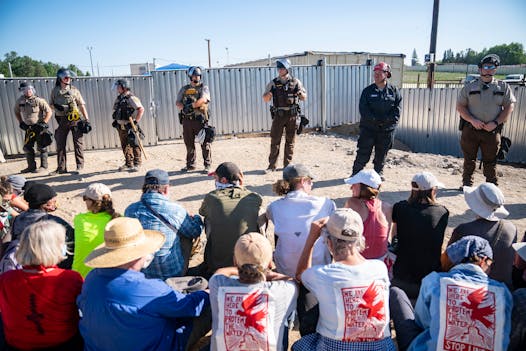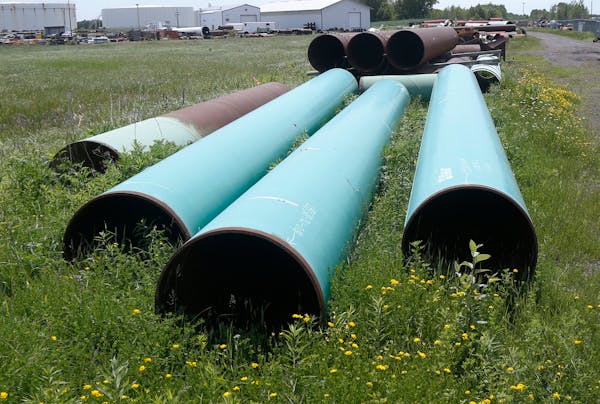Oil will begin flowing through the controversial new Line 3 pipeline across northern Minnesota on Friday after Enbridge announced that work on the controversial project is "substantially complete."
The $3 billion-plus pipeline is a replacement for the 50-year-old Line 3, which is corroding and operating at half capacity.
Construction of the $3 billion-plus Minnesota portion of the pipeline — one of the largest projects in the state in recent history — began last December after a six-year battle before state regulators.
"From day one, this project has been about modernizing our system and improving safety and reliability for the benefit of communities, the environment and our customers," Enbridge CEO Al Monaco said Wednesday in a news release. "Line 3 was developed and executed with the most state-of-the-art approach to design, construction and environmental management."
The pipeline also restores full flow of oil to 760,000 barrels a day, boosting earnings for the Calgary, Alberta-based Enbridge.
Hundreds have been arrested along the pipeline route as regular protests occurred during the construction. Environmental groups and Ojibwe tribes fought the pipeline before the Minnesota Public Utilities Commission and in multiple lawsuits, arguing it would open a new region of Minnesota lakes, rivers and wetlands to degradation from oil spills, as well as exacerbate climate change.
"This is not the outcome we hoped for, but the fight to stop Line 3 has always been a fight for climate justice and a future free from fossil fuels, and that fight will not stop just because Enbridge has succeeded in building this pipeline," Margaret Levin, director of the Sierra Club North Star Chapter, said in a statement.
The pipeline runs partly on a new route, veering off from Enbridge's current corridor that contains six oil pipelines running across Minnesota to the company's terminal in Superior, Wis., at the Clearbrook station.
The Public Utilities Commission (PUC) approved the new Line 3 in early 2020, saying it was needed for safety reasons and to meet regional oil demand. The Minnesota Department of Commerce, acting for consumers, argued that a new Line 3 was not needed because fossil fuel demand is expected to fall over the coming years, although Enbridge has said all along its forecasts show it is needed.
"If we're investing in something there's no demand for, [investors] are not going to be too happy," said Mike Fernandez, Enbridge's chief communications officer. "There's long been an established demand."
The Minnesota portion of Line 3 is the last link of the 1,097-mile transnational pipeline to be finished. It starts in Edmonton, Alberta, and crosses small portions of North Dakota and Wisconsin. It will carry a particularly thick crude from Alberta's tar sands, also known as oil sands.
Line 3 has employed more than 5,000 workers in total along the pipeline's 340-mile route across the state. The project had strong support from labor unions as a result.
"We are proud to have completed construction of a replacement pipeline that will reduce spill risks and shipments of crude oil by rail," Dan Olson, head of the Duluth-based local of the Laborers Union, said in a statement.
"Water protectors," as Line 3 protesters call themselves, have been a constant presence along the pipeline route in recent months, staging acts of civil disobedience like chaining themselves to pipeline equipment.
Honor the Earth, a Minnesota-based Indigenous environmental group, estimates about 900 people have been arrested.
"Line 3 is a crime against the environment and Indigenous rights, waters and lands, and it marks the end of the tar sands era — but not the end of the resistance to it," Winona LaDuke, executive director of Honor the Earth, said Wednesday. "I personally want to recognize the many Water Protectors over the years who came from Native communities, from Minnesota cities and from around the country to put their lives on hold to bear witness to the dangerous environmental folly that is Line 3."
Enbridge so far has spent $2.9 million reimbursing local police costs along the construction route, according to the PUC.
The payments were mandated by the commission — and flow through a PUC escrow account — to avoid large bills for counties and cities in policing pipeline protests. But they have been criticized by anti-pipeline groups that say Enbridge has been using local police as a security force. The company and law enforcement reject such allegations.
Enbridge had set a fourth-quarter completion date for Line 3, and it looks like the company is ahead of schedule by switching on the pipeline Friday. The flow of oil will be slowly ramped up, Fernandez said.
However, the construction project has run into several issues, the most serious of which is an aquifer breach near Clearbrook.
As a result of that breach, the Minnesota Department of Natural Resources earlier this month ordered Enbridge to pay $3.32 million for failing to follow environmental laws during construction.
While working near Clearbrook, Enbridge dug too deeply into the ground and pierced an artesian aquifer. The incident, which happened in January but was not discovered by the DNR until June, has led to a 24-million-gallon groundwater leak, endangering a nearby wetland.
Enbridge failed to report the breach as it should have, the DNR has said. The DNR called the company's actions a "clear violation of state law" and sent the matter to the Clearwater County Attorney for possible criminal prosecution.
During the summer, Enbridge also had 28 spills of drilling mud during construction, creating at least 10,000 gallons of muck, the Minnesota Pollution Control Agency (MPCA) confirmed in August in response to DFL lawmakers who demanded an accounting of the spills.
The MPCA said it is investigating those spills.
Pipeline opponents have fought various regulatory permits for Line 3 in state and local courts this year. But only one case remains pending, a suit in federal court against the U.S. Army Corps of Engineers for its water and wetlands permit for Line 3's construction.
Pipeline opponents had hoped that President Joe Biden's administration would essentially revoke the Corps' permit. Instead, the federal government doubled down on support for the permit.
The old 282-mile Line 3 will be "decommissioned" in the coming months, meaning it will be cleaned and monitored and largely left in place. Landowners were given the option to have the pipeline removed from their property at Enbridge's expense.


